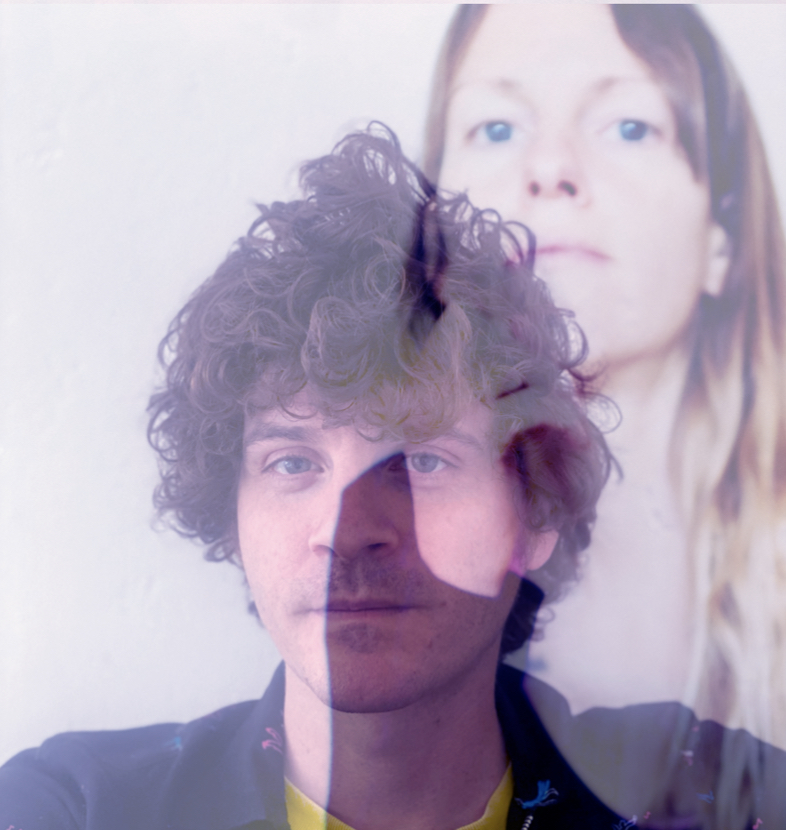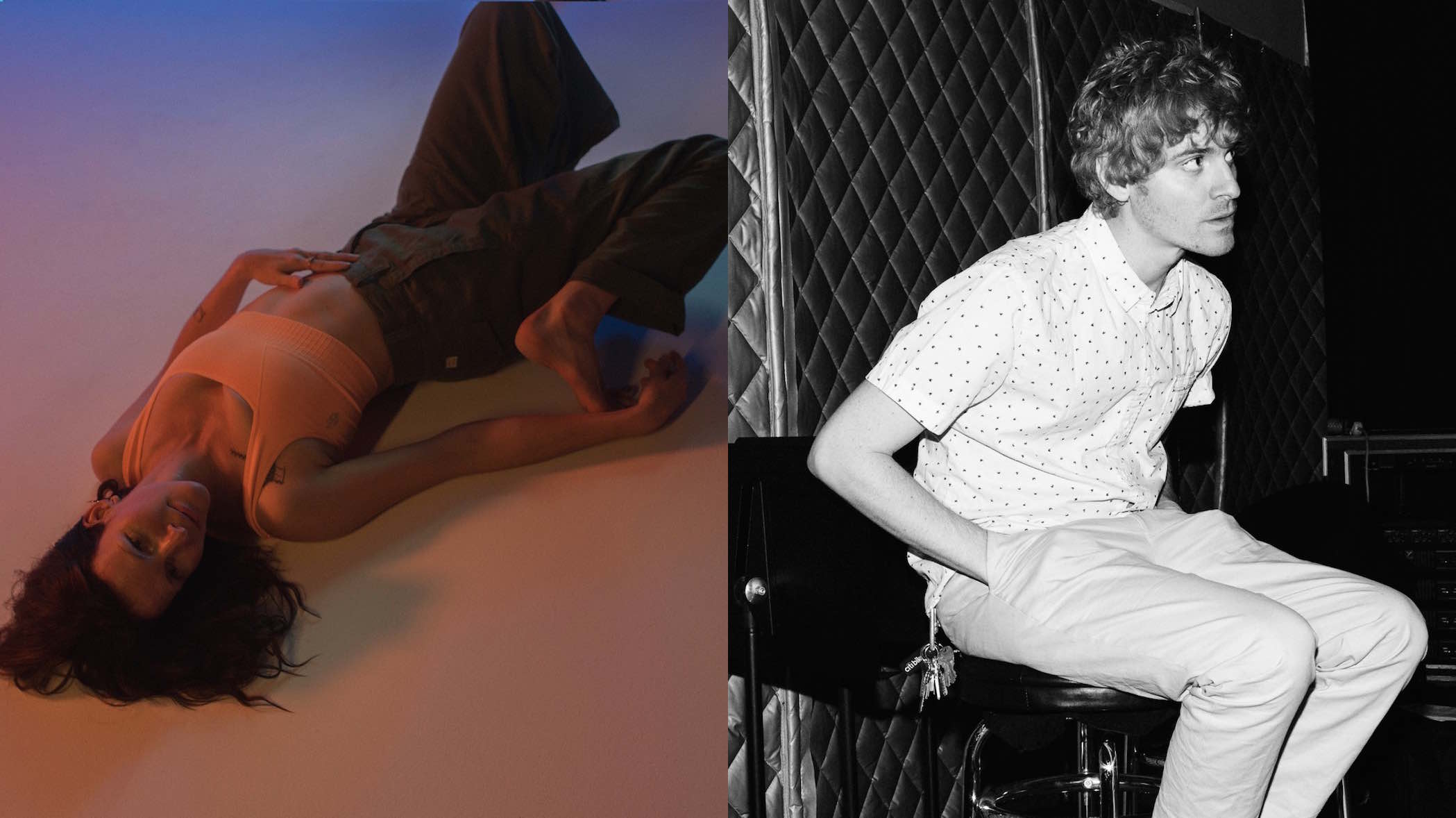This article appears in FLOOD 12: The Los Angeles Issue. You can purchase this special 232-page print edition celebrating the people, places, music and art of LA here.
Although their music may contain plenty of electronic elements, there’s nothing inorganic about the collaboration between composers Kaitlyn Aurelia Smith and Emile Mosseri. This seemingly unlikely duo—Smith is best-known for her cosmic synthesizer work, while Mosseri (a member of indie rockers Human Love, formerly known as The Dig) is an acclaimed composer of film soundtracks, including the Academy Award–nominated score for 2020's Minari—met right before the pandemic started, and began trading files without a set style or aesthetic in mind.
The happy result is a two-part collaborative album: The first installment, I Could Be Your Dog (Prequel), came out in September 2021, while the second, I Could Be Your Moon (Sequel), has just been slated for a May 27 release. We spoke with the two of them about the genesis of the project, their mutual fandom, and how this collaboration was spiritually influenced by their time in Los Angeles.
How did you two meet?
Emile Mosseri: We met on the internet. We were sort of fans of each other’s work; I was a big fan of Kaitlyn’s and she reached out after she saw a film that I scored. We both lived in LA at the same time for a few years before we actually got it together to hang out a couple of weeks before she moved [away from Los Angeles].
How did the process work once Kaitlyn left town?
Emile: It started with a track that turned into a song called “Log in Your Fire,” where Kaitlyn sent me these incredible sonic beds that she’d made. I heard some melodies that felt implied by what she sent, so I would sort of sing these sketches and send them back to her. We would send these files back and forth, but we’d never go too deep into the weeds with it; we would just add different things onto each other’s tracks. It was fun because sometimes I would send her something, and she would send it back and it would be unrecognizable to me in the best way, you know? Then I would do something and send it back to her. It was this extended musical conversation during this really isolating time, because we made this during the peak of the pandemic. In LA, we had the worst [COVID] numbers on the planet at the time, so this was like a vibe replenisher in that sort of way.
“It was this extended musical conversation during this really isolating time. In LA, we had the worst [COVID] numbers on the planet at the time, so this was like a vibe replenisher in that sort of way.”
— Emile Mosseri
How would you say I Could Be Your Dog (Prequel) is different from I Could Be Your Moon (Sequel)?
Emile: It seems like a continuation, but it also has a totally different color and energy to it. We’ve talked about this before, but it feels more adventurous and more song-based at the same time; it feels like we went further in both directions. It just feels like a natural next step in our collaboration where both elements of the music were deeper, and somehow it feels more blue and green to me. I Could Be Your Dog feels a little more bright. It’s hard to know what words to use when you're talking about music, especially Kaitlyn’s music because it’s so colorful and so expansive and so cinematic and also grounded. The way that we talk about this record, especially before it comes out, is tricky because in a way maybe we’re the last two people to ask. Does that resonate with you?
Kaitlyn Aurelia Smith: Yeah, it definitely does. I feel similar; it’s so funny to try to talk about music when you’re the one who made it, because everything is just blobs and it’s really hard to separate the creative blob from analyzing what it turned out to be. I guess in a way you’re talking about aspects of yourself, because those come out during creativity and that’s hard to talk about. The first side of I Could Be Your Dog feels more like a question, and the second side sounds like an answer to the question. I don’t really know how to elaborate on that, exactly, but somehow they feel like they’re a complete sentence together.

That makes sense, because individually neither of your music is necessarily easy to categorize.
Emile: The only mission statement [for this project] was that I wanted to sing melodies that I liked and I hoped Kaitlyn liked, or send her something that I hoped would excite me and excite her. That was sort of the only goal: communicating with music that way. Also, when you’re collaborating with an artist of Kaitlyn’s character, you have to rise to it. It’s inspiring because you have to make sure that whatever you’re adding to what she sent is honoring it at the level of what she produced, so I think it was good to send music back and forth and push each other that way.
Kaitlyn: That is so nice, and I definitely feel that is mutual for sure. I think that’s part of the excitement when you get to collaborate with someone you’re inspired by, because I was like that, too. I wanted to make sure everything I sent to Emile was something that he liked and inspired him. There’s just something that’s so beautiful in collaboration when you find someone who continues that inspiration pool with you, and who you can keep growing as a musician with.
“There’s just something that’s so beautiful in collaboration when you find someone who continues that inspiration pool with you, and who you can keep growing as a musician with.”
— Kaitlyn Aurelia Smith
Emile: What was beautifully simple about this project is we were each other’s audience, so we were only thinking about each other as the audience. That’s sort of a built-in safe way of making music without the outside world coming into the process. It’s like that with film, too; you only have to worry about what the director thinks—and what you think—and how it lands with the outside world is something you don’t even have the luxury of thinking about when you’re working on it. It was a similar vibe with this where we were in our own sort of bubble and musical conversation.
How would you say Los Angeles informed this album?
Kaitlyn: The background of the initial meeting for Emile and I was on various hikes in LA, so I feel like that scenery was the natural background image in our minds, and created an ambience as the only context of us hanging out in person. I think it definitely played a part.
Emile: I moved to LA a few years ago and started scoring films, and that opened certain doors that exposed me to other artists, Kaitlyn being one of them. To me, knowing Kaitlyn is all connected to LA and this Hollywood story in my mind: moving out to LA and meeting all of these exciting artists through the medium of film. So in a layered way it’s deeply connected to this record. There’s even a song titled “Glendora,” which sounds like “Glendale” and it sounds like a flower at the same time. I don’t know if it translates sonically and sounds like an LA record, but it feels connected to LA spiritually.
Kaitlyn: I feel like that really sums it up. When you’re collaborating with someone remotely, if you haven’t met them in person you’re kind of collaborating with them astrally. You’re not even really physically collaborating with them that much, and so [hanging out in LA] was our only physical-life part of the collaboration, and I think that was definitely a foundation of the music. I’m not sure what an LA-sounding album would sound like. I’m really curious, do you have any recommendations of any LA albums to check out?
I always associate it with the Germs and that nascent punk scene.
Emile: Yeah that makes sense, the LA punk scene or surf vibe. Like more recently jangly surf; I associate that with LA because I hear it all the time, but that’s because I live here. It could be everywhere.
“When you’re collaborating with an artist of Kaitlyn’s character, you have to rise to it. It’s inspiring because you have to make sure that whatever you’re adding to what she sent is honoring it at the level of what she produced.”
— Emile Mosseri
Smith: The other day I was playing around with this plug-in that helps you create demon vocals and just different monster sounds and I was like, “Man, I really want to create a metal album and sing through this plug-in.” I was thinking about how fun it would be to make an LA-sounding metal album.
You two can make it together.
Emile: Well, sometimes Kaitlyn will have me sing through some lyrics or melodies or she’ll process them through a character. Not a demon, but it will give my voice a different body.
Kaitlyn: I know. It’s fun making characters.
Emile: Yeah, it’s fun. It could give you a god complex if you’re not careful. FL







